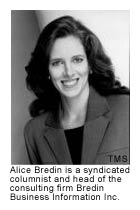|
Find good IT support
|
 |
September 25, 2000: 2:17 p.m. ET
A good technical lifeline can be as important as a lawyer or an accountant
By Alice Bredin
|
NEW YORK (CNNfn) - In today's marketplace, technology is so critical to business success that having good technical support is often as important as having a good attorney and accountant. Computer problems can result in lost productivity and data, as well as cause a business to appear unprofessional to clients and colleagues.
 For home-based businesses, finding IT support can be a challenge. These companies' technology needs tend to be sporadic, so hiring full-time IT help is unrealistic. When tech help is needed, however, home-based business owners need to have a reliable resource they can turn to on short notice. For home-based businesses, finding IT support can be a challenge. These companies' technology needs tend to be sporadic, so hiring full-time IT help is unrealistic. When tech help is needed, however, home-based business owners need to have a reliable resource they can turn to on short notice.
The best way to locate a dependable IT consultant is by asking other business owners for referrals, searching phone or online directories or calling local technology associations for member directories. After you find potential providers, separate the good from the mediocre and pinpoint one whose work approach is a fit for your business. Use these tips to identify the best resource for your needs.
- Interview multiple service providers. Meet with at least three vendors so you can get a feel for the types of service packages and pricing available in your area. Ask them about hourly rates, the availability of retainer relationships, the type of equipment they handle and if they offer a guaranteed response time to emergency situations. You may also want to know whether or not they can service your equipment remotely and implement advanced solutions, such as virtual private networks.
- Compare apples to apples. Because technical consultants package their goods in a number of ways, comparing the true costs of one to another can be difficult. For example, a provider may offer one rate for remote troubleshooting and another for on-site work. In order to compare this person's prices to another consultant's standard hourly rate, estimate the total hours of remote and in-house service you will need, then average these costs to come up with an hourly rate for this provider.
- Know your total costs. Don't assume that IT costs are simply a total of equipment plus maintenance. The actual equation is a little more complicated. It should include the value of the time you spend addressing IT issues, such as when you troubleshoot snafus or take care of routine tasks such as backing up data. In addition, you will need to account for the value of lost productivity due to IT problems. This is where the bill starts to add up. For some businesses, simply being without Internet access for a few hours can have a huge impact on the bottom line.
- Consider students. If your computer equipment is not networked, your IT needs may be minimal. In this case you might consider hiring a tech-savvy college student as your IT consultant. She or he should be able to set up your Internet connection, keep your system optimized and take care of other details that may be beyond your level of technical expertise. While this option is likely to be more affordable than an IT company's plan, be aware that a student may not be able to come running in emergencies. If your company would suffer a great deal from even short-term technology failures, going with a professional service provider may be the better investment in the long run.
- Get references. Before you sign an agreement with an IT provider, speak with three of her or his customers. Ideally, these will be businesses that are a similar size to your own, with similar needs. If you decide to work with a college student, ask to speak with a professor or former employer.

|
|
|
|
|
 |

|

